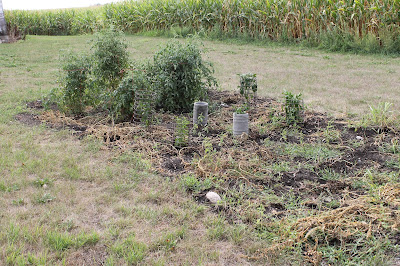Include Easy Plants - If this year is your first year to garden I would include at least one easy plant, or dare I say no-fail plants. The first easy plant I recommend is radishes. Radishes require no prep work and can go straight from seed to garden. They are easy to care of too. Make sure you give them adequate water and that you follow the instructions on the seed packet for spacing and depth. The added plus of radishes is that they have a fast maturity, so you'll be able to enjoy the harvest of your efforts mid-summer. The next easy plant I recommend is tomatoes. There are many varieties of tomatoes and I have found good results with many. My favorite are probably Roma. Roma plants don't get as tall or heavy as other tomato plants, so they are easier to maintain. Make sure your tomato plant gets plenty of light and regular water. Now, tomato plants are susceptible to diseases, so if you start to see some diseased leaves, remove them after the plant is at least knee-high. The final easy plants I recommend are pumpkins and gourds. I swear pumpkins and gourds can grow anywhere and with no help at all, but the last time I gave that recommendation to a friend a few years ago we had a drought and that wasn't the case... The main things that pumpkins and gourds need is space and adequate water. If you plan on including any vine plants in your garden, consider having a separate patch for them, so you can give their vines plenty of space to spread out and grow.
Plant What You Eat - This seems easy enough, but when making your garden plan, remember to plant what you are going to enjoy eating. If you don't like green beans, don't plant green beans. Now at the same time, if you eat potatoes everyday, plants some potatoes. Also consider what you are interested in canning. For many years I have planted some form of a salsa garden with tomatoes, peppers, onions and cilantro. My family always has a jar of salsa open and we have never had a problem eating each year's salsa. Also, my family has homemade pizza each Friday night, so I always can pizza sauce each year. We also really enjoy canning pickles. If you are looking for some pickle tips, check out my friend Mary of Farm Girl Cook'n's latest post with pickle tips and a recipe!
Location, Location, Location - After you have decided what you want to plant in your garden you need to think about the amount of space you'll need for it and where to locate it. Most vegetables need direct sunlight and a well drained soil in a level area. Also, make sure this area is away from trees or shrubs. You won't want them to compete for water and nutrients from your garden. Lastly, make sure your garden can be reached by a hose. Now you might be thinking that you're going to build muscle and endurance by using a watering can for your garden, but chances are, as the summer goes on, you're going to neglect keeping your garden watered regularly if you have to do so. Check out my Where to put your Vegetable Garden post for more tips and details.
Weed, Weed, Weed - This might seem like a no-brainer, but in order to have a successful first go-around at gardening, you need to keep up on weeding. Keep a regular weeding schedule for the entire spring and summer. And if you go on a summer vacation, be prepared to weed when you get home. For some reason, it's like weeds know when you're gone and sprout up like crazy to greet you when you get home. If your weeds get out of hand, weeding after a rain makes them easier to pull out. Also, to help control weeds, after plants have good growth, consider laying down a mulch or straw to help give the plants a barrier from weeds.
Protection, Protection, Protection - It is a good idea to give your plants some protection from predators throughout the growing season. Depending on where you live, predators could be rabbits, squirrels, deer, etc. When your plants are young, consider using milk jugs that have had the bottoms cut off (which also act as a "greenhouse" at the same time), or old clay tiles. After they outgrow the milk jugs or tiles, you should consider investing in a fence or a dog.
I hope these basic tips help prepare all first-time gardeners for the planting season. Most importantly I hope your garden allows you to get a little dirty, be a little creative and reduces your stress. What tips would you add to the list for beginners? Remember to Comment for a Cause!
Looking for more tips - check out my tips and others on Wayfair!



























